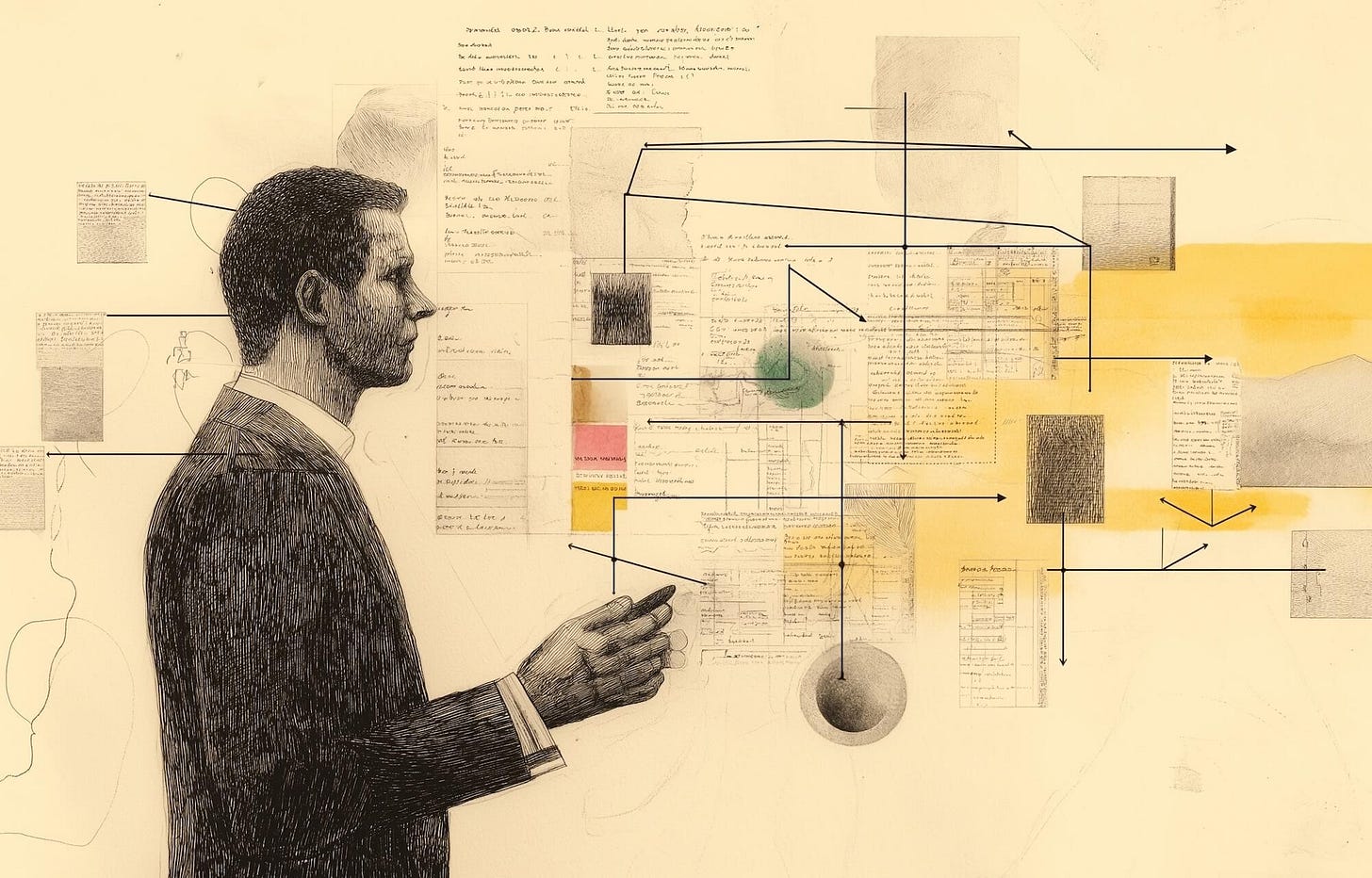Curate your creative diet
An extended note-to-self on consumption and creativity
I had an experience recently all too rare. I really don't know why I don't make the time for it more often.
I opened a book to read late evening, Yuval Levin's The Great Debate, a history of Edmund Burke and Thomas Paine's feud of political ideologies. The specific book isn't terribly relevant to the point, though.
I sat there reading for, I dunno, at least 2 hours uninterrupted. No phone-touching, no screens. Just myself and the work, and the occasional note scribbled on a stack of index cards on the desk next to me.
Something just clicked and I got in the zone. I'd read a section, then go back and read it again. Probably read 80 pages. As I said, this almost never happens these days.
As I read, I wrestled with its ideas. Pull quotes from Burke triggered my own thoughts to investigate later: on the meaning of culture, the benefits to preserving social order, the villainy of the French Revolution that we didn't learn about in high school history class, the specific dangers of utopian projects. Big ideas, small ideas, and everywhere in between.
I didn't sit down with the goal to create anything; I was just soaking up Levin's writing. But this sort of active, engaged, curated consumption does something different than your typical accidental 30-minute Instagram scrolling session.
Instead of mindless waves pixels and sound leaving your brain as fast as they enter, the ideas get to come in and stay a while. They sit and simmer and cook up something new. And also since I chose that book intentionally, they're ideas I specifically wanted to engage with in that moment.
This got my mind turning on the relationship between what we consume and what we create.
Creativity is unlocked by curating what you consume, and consuming intentionally.
“You are in many ways a product of your experiences and stimulus. In one sentence, your creative output can be thought of simply as a personal interpretation of external stimulus. The best part about this is you get to control the input.” —Adam Singer
It's easy to consume lazily and unceasingly. Modern media technology requires no effort on our part as it dumps a shower of content on us every day that we don't consciously choose. We let the systems pull us around rather than pushing where we want to go.
We scroll feeds shoveled to us on X and LinkedIn.
We play an endless loop of reels on TikTok and YouTube that require no attention span.
We buy stuff Amazon recommends to us without second thought.
Letting others' content wash over us is much less work than our own creative pursuits. We don't even have to leave our seat or move our hands, plus that dopamine hit comes much faster. When we watch reels, we get that pang right away. Tap like, next, next, like, next.
But it's the empty calories of the Kit Kat bar. There's no lasting anything to get out of it. Scroll for an hour and all you've got is 1 less hour. No ideas, nothing to toss into your creative hopper and work with later.
Today's algorithm-driven products are scientifically tuned to feed us this virulent strain of addictive content. They don't care really if we create. The feeds are ironically driven by some that do create, but they create with the goal of keeping your attention, not to spark your creative engine. It's a self-licking ice cream cone. Creator wants attention, creator creates with the sole purpose of more attention. Rinse, repeat.
Consume carefully
Deep satisfaction comes from being generative, the wholesome calories. And consumption and generation are connected.
What you generate is a product of what you consume. What you consume informs and influences your creative output: it's the fuel.
My hours spent with Burke and Paine left me with a page and a half of notes to drive future writing sessions, and to connect with other related ideas. Even in real time I noted how Burke's thoughts on social order connected with another idea from Russell Kirk on American order's roots in the classics. Surely there's fodder for some future writing in there.
Generation doesn't require some kind of divine inspiration to fill an empty canvas. Most generation is a form of synthesis.
When we create — whether we're talking writing, painting, building furniture, or making software — we compose new ideas from existing ones. Creativity is all a form of novel recombination.
To be more generative, you don't need to gin up completely original materials in a vacuum. Our favorite artists and innovators of the past remixed what they learned of and consumed into something new.
Andy Warhol took pop culture and silkscreen printing and created an iconic look. Gutenberg took movable type components and oil-based ink to create a way to quickly reproduce prints. Brian Eno combined atmospheric sounds and generative systems to create a whole new genre of music.
What you consume drives what you generate.
Keep this in mind when you're mindlessly doomscrolling. If we want to be more generative, it's easier when we're thoughtful.
Take control of consumption, and create more
Passive consumption is easy, passive, low-energy.
Generation is active, energetic. Requires your participation. Requires thoughtful selection of inputs.
When you let others form our consumption habits, you're on the sidelines. When you curate and create, you're in the arena.



